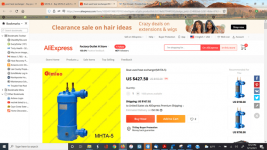Hi again, Blue. I appears you have no heater now, and that's your need. I don't see mention of a spa in your signature, so what I'm about to show may be less relevant. Like your situation, my wife likes very warm water. Yesterday afternoon 3:45pm (CDT), we decided a bottle of chilled Prosecco in the spa (approx 350 gallons) would be nice. Air temp at that moment was 97 degrees. Water temp was 88. I set the water valves so all return was to the spa and about 95% of the suction was from the spa (wife likes the sound of a little spillover). Set pump on manual and 2300 rpm and turned on the Pentair Mastertemp 400 heater. Ten minutes later the temp in the spa was 96. That was with 400,000 btu heat running and 95% of the water recirculating through the spa and heater. Your proposed A/C heat exchanger at 55,000 btu in theory, being 1/7th the heat potential, would presumably take seven times as long to heat that 350 gallons. 70 minutes? Just for the spa? 12,335 gallons would take 35 times as long? 40 hours?
My point. Even if it works, it's probably not going to work very well.
BTW, if you're really using pucks to chlorinate your pool, you're eventually going to have a CYA problem, too.
And if I want to sit in our spa, I open the cover and get right in, no waiting, even in the middle of winter surrounded by snow and ice. Point being, different devices work differently.
But what I’m really curious about is your financial analysis that made you not want to get this. I’m an engineer, I like to see numbers. And yes, one of my teachers drilled total lowest lifecycle cost into my head. I’m curious about getting one of these units myself in the future, so I will do an lifecycle analysis at some point.
But in the meantime yes getting it installed is a hassle, but the few threads I’ve seen where people got one installed it made a noticeable difference in their water temp. And while it may not be completely free energy it would seem with a VSP tied to the system (so the pump doesn’t run 24/7) the amount of energy needed would be minimal. So it could likely be considered free energy for all practical purposes, except of course the initial purchase price.
Funny enough the exact best use case of this device is exactly your don’t wait to use, only for pools. If you have a regular heater you don’t normally run it 24/7, so you need to plan and use the heater. But this recovery device you’d just run 24/7 because it’s free or almost free heat, so your pool is warmer 24/7.
One also has to be very careful with how much heat energy you take out of the refrigerant with an external heat exchanger. AC compressor units have their own set of HI/LO operating pressure and temperatures designed around the specific setup of the heat exchanger and expansion coils (the A-coils inside your air handler). Pulling too much heat out of the refrigerant could cause it to liquefy and then that liquefied refrigerant could hit the compressor and destroy it.
Temps of the condenser won’t be a problem, any pools temps are well within the operating temperature range of an AC unit.
Also I need to review my mechanical engineering textbooks but the purpose of the condenser is to condenser the refrigerant. Definitely want that to be a complete liquid before going to the expansion valve. The whole reason heat pumps work is the phase change of the refrigerant going from a liquid to a gas.
And when you buy the system from Hotspot, not bits and pieces (which I don’t recommend) the condenser size is matched to the condenser size of your AC unit. And if I believe if needed also a small accumulation tank. This is done to not change the amount of refrigerant used, which could indeed cause issues. There’s a three way valve added and if your pool calls for heat the refrigerant is pulled out of the AC condenser and directed into the pool condenser. If the pool doesn’t need heat it pulls the refrigerant out of the pool condenser and routes it through the air cooled condenser as normal.
I do agree that if the OP has south facing room and doesn’t object or have restrictions against it that solar heating would be a better way to go to increase the average pool water temp. I’d really like to do that myself, but there’s some covenants about it in our neighborhood. That is why I was considering the Hotspot instead.





